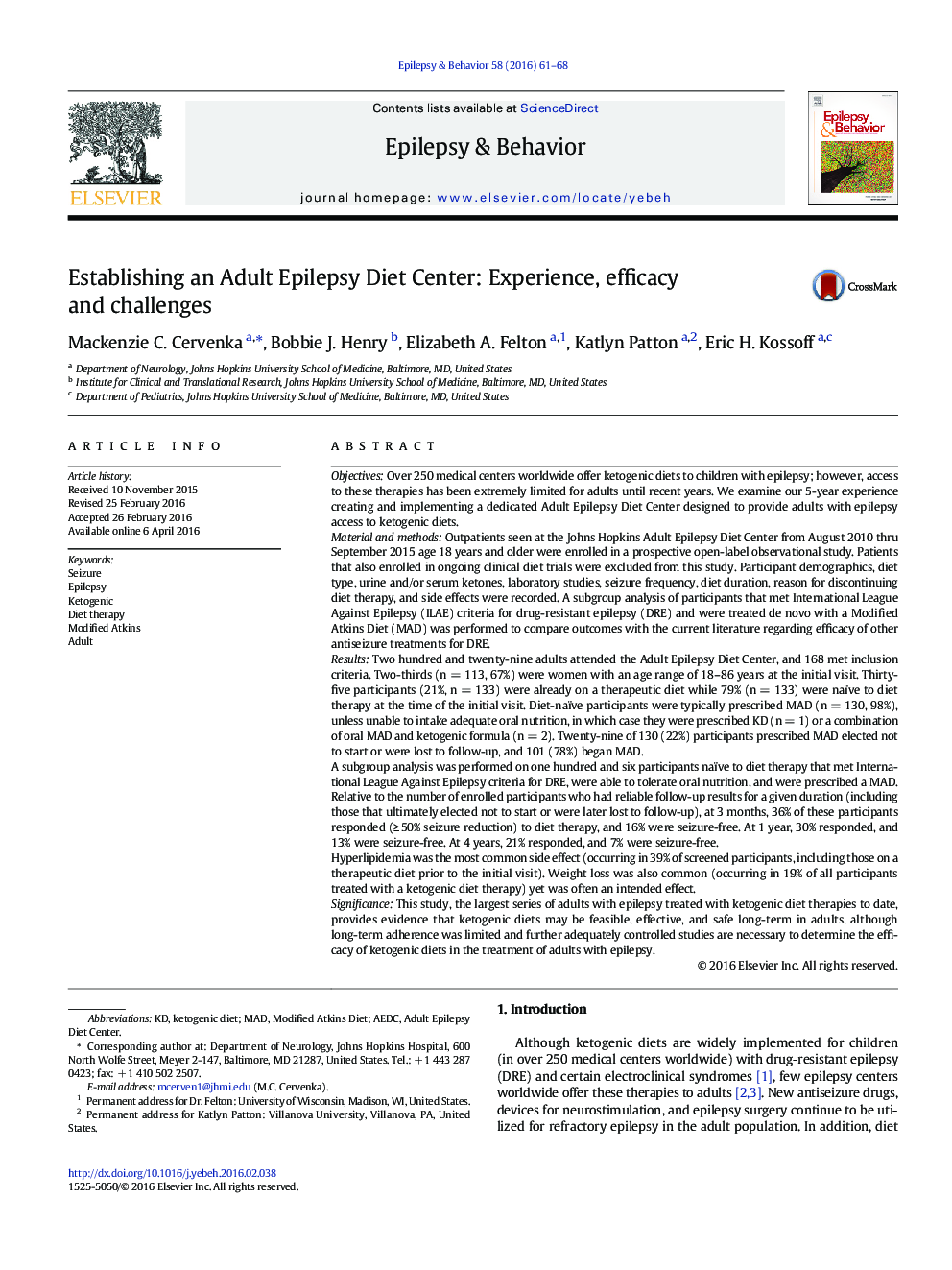| کد مقاله | کد نشریه | سال انتشار | مقاله انگلیسی | نسخه تمام متن |
|---|---|---|---|---|
| 6010164 | 1579833 | 2016 | 8 صفحه PDF | دانلود رایگان |
- There is a growing demand for ketogenic diet therapies in adults with epilepsy.
- Ketogenic diets may be safe, feasible, and effective long-term in adult epilepsy.
- Adherence remains a major challenge in using ketogenic diets in adults.
ObjectivesOver 250 medical centers worldwide offer ketogenic diets to children with epilepsy; however, access to these therapies has been extremely limited for adults until recent years. We examine our 5-year experience creating and implementing a dedicated Adult Epilepsy Diet Center designed to provide adults with epilepsy access to ketogenic diets.Material and methodsOutpatients seen at the Johns Hopkins Adult Epilepsy Diet Center from August 2010 thru September 2015 age 18 years and older were enrolled in a prospective open-label observational study. Patients that also enrolled in ongoing clinical diet trials were excluded from this study. Participant demographics, diet type, urine and/or serum ketones, laboratory studies, seizure frequency, diet duration, reason for discontinuing diet therapy, and side effects were recorded. A subgroup analysis of participants that met International League Against Epilepsy (ILAE) criteria for drug-resistant epilepsy (DRE) and were treated de novo with a Modified Atkins Diet (MAD) was performed to compare outcomes with the current literature regarding efficacy of other antiseizure treatments for DRE.ResultsTwo hundred and twenty-nine adults attended the Adult Epilepsy Diet Center, and 168 met inclusion criteria. Two-thirds (n = 113, 67%) were women with an age range of 18-86 years at the initial visit. Thirty-five participants (21%, n = 133) were already on a therapeutic diet while 79% (n = 133) were naïve to diet therapy at the time of the initial visit. Diet-naïve participants were typically prescribed MAD (n = 130, 98%), unless unable to intake adequate oral nutrition, in which case they were prescribed KD (n = 1) or a combination of oral MAD and ketogenic formula (n = 2). Twenty-nine of 130 (22%) participants prescribed MAD elected not to start or were lost to follow-up, and 101 (78%) began MAD.A subgroup analysis was performed on one hundred and six participants naïve to diet therapy that met International League Against Epilepsy criteria for DRE, were able to tolerate oral nutrition, and were prescribed a MAD. Relative to the number of enrolled participants who had reliable follow-up results for a given duration (including those that ultimately elected not to start or were later lost to follow-up), at 3 months, 36% of these participants responded (â¥Â 50% seizure reduction) to diet therapy, and 16% were seizure-free. At 1 year, 30% responded, and 13% were seizure-free. At 4 years, 21% responded, and 7% were seizure-free.Hyperlipidemia was the most common side effect (occurring in 39% of screened participants, including those on a therapeutic diet prior to the initial visit). Weight loss was also common (occurring in 19% of all participants treated with a ketogenic diet therapy) yet was often an intended effect.SignificanceThis study, the largest series of adults with epilepsy treated with ketogenic diet therapies to date, provides evidence that ketogenic diets may be feasible, effective, and safe long-term in adults, although long-term adherence was limited and further adequately controlled studies are necessary to determine the efficacy of ketogenic diets in the treatment of adults with epilepsy.
Journal: Epilepsy & Behavior - Volume 58, May 2016, Pages 61-68
